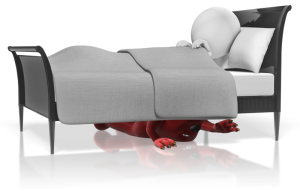July 1st, 2018, Dr Chee L Khoo
We all know Prazosin (Minipress) as an alpha 1 blocker used to treat hypertension. Prazosin is also useful in treating urinary hesitancy associated with prostatic hyperplasia by blocking the alpha-1 receptors which control constriction of both the prostate and urethra. Obviously, we now have better and newer agents for hypertension and bladder problems. As such, Prazosin is a long-forgotten agent. Alpha 1 receptors are not only found in vascular and urothelial smooth muscles, they are found throughout the central nervous system.
In randomised trials, prazosin, has been reported to be effective in alleviating nightmares associated with post-traumatic stress disorder (PTSD) in military veterans. Prazosin used to alleviate nightmares? What is the rationale?
Trauma-related nightmares and sleep disturbance are common symptoms of post-traumatic stress disorder (PTSD). Enhanced central nervous system adrenergic activity and its persistence during sleep provide a rationale for the use of antiadrenergic medications to ameliorate these symptoms. Prazosin readily enters the CNS. That’s the theory anyway. In practice, does Prazosin help to alleviate the chronic nightmares and improve overall clinical status in patients with PTSD?
There have been quite a few randomised placebo-controlled trials over the last 15 years showing moderate positive effects of prazosin1-7. Four of the trials involved US servicemen while one involved US civilians and another involved Iranian civilians. However, the trials had small number of subjects involving between 10-100 subjects and the follow up period was only up to 15 weeks.
The Prazosin and Combat Trauma PTSD (PACT) trial published their results in February 2018 in the New England Journal of Medicine (NEJM). 304 veterans underwent randomisation to either placebo or prazosin. Prazosin was titrated to a maximum of 20mg. At 10 weeks, there were no difference between the groups in relation to frequency of distressing dreams and sleep quality. Subjects continued to receive either prazosin or placebo for another 16 weeks. At 26 weeks, there were no significant differences either.
Why the surprising negative results?
It is not uncommon for patients with PTSD to also be on benzodiazepines for concomitant anxiety. In this cohort of patients, only 13% of patients on prazosin and 17% of patients on placebo were taking a benzodiazepine. This suggest that the cohort may be in clinically stable condition and as such, prazosin is less likely to help.
Further, participants who were unable or unwilling to discontinue trazodone, an anti-depressant with alpha adrenergic action were excluded. This may have excluded a significant number of patients who may have responded to prazosin.
This cohort also had lower than expected mean BP also suggest low baseline adrenergic activity suggesting that unstable PTSD was unlikely in this cohort.
Sleep apnoea or other sleep disorders, which is reportedly common amongst sufferers of PTSD, were not excluded in this trial and the authors admitted that this may have masked the benefits of prazosin.
New or worsening suicide was less common in the prazosin group although the absolute numbers were small.
Until we have studies with more refined characterisation of the “ideal” PTSD patient who may respond to prazosin, there may be patients with chronic PTSD and frequent nightmares who may respond to Prazosin.
Access the abstract here.
- Reference
- Raskind MA, Peskind ER, Kanter ED, et al. Reduction of nightmares and other PTSD symptoms in combat veterans by prazosin: a placebo-controlled study. Am J Psychiatry 2003; 160: 371-3.
- Raskind MA, Peskind ER, Hoff DJ, et al. A parallel group placebo controlled study of prazosin for trauma nightmares and sleep disturbance in combat veterans with post-traumatic stress disorder. Biol Psychiatry 2007; 61: 928-34.
- Taylor FB, Martin P, Thompson C, et al. Prazosin effects on objective sleep measures and clinical symptoms in civilian trauma posttraumatic stress disorder: a placebo-controlled study. Biol Psychiatry 2008; 63: 629-32.
- Germain A, Richardson R, Moul DE, et al. Placebo-controlled comparison of prazosin and cognitive-behavioral treatments for sleep disturbances in US military veterans. J Psychosom Res 2012; 72:89-96.
- Raskind MA, Peterson K, Williams T, et al. A trial of prazosin for combat trauma PTSD with nightmares in active-duty soldiers returned from Iraq and Afghanistan. Am J Psychiatry 2013; 170: 1003-10.
- Ahmadpanah M, Sabzeiee P, Hosseini SM, et al. Comparing the effect of prazosin and hydroxyzine on sleep quality in patients suffering from posttraumatic stress disorder. Neuropsychobiology 2014; 69: 235-42.
- Raskind MA, et al. Trial or Prazosin for Post-traumatic stress disorder in Military Veterans. N Engl J Med. Feb 8, 2018, 378 (6); 507-517
